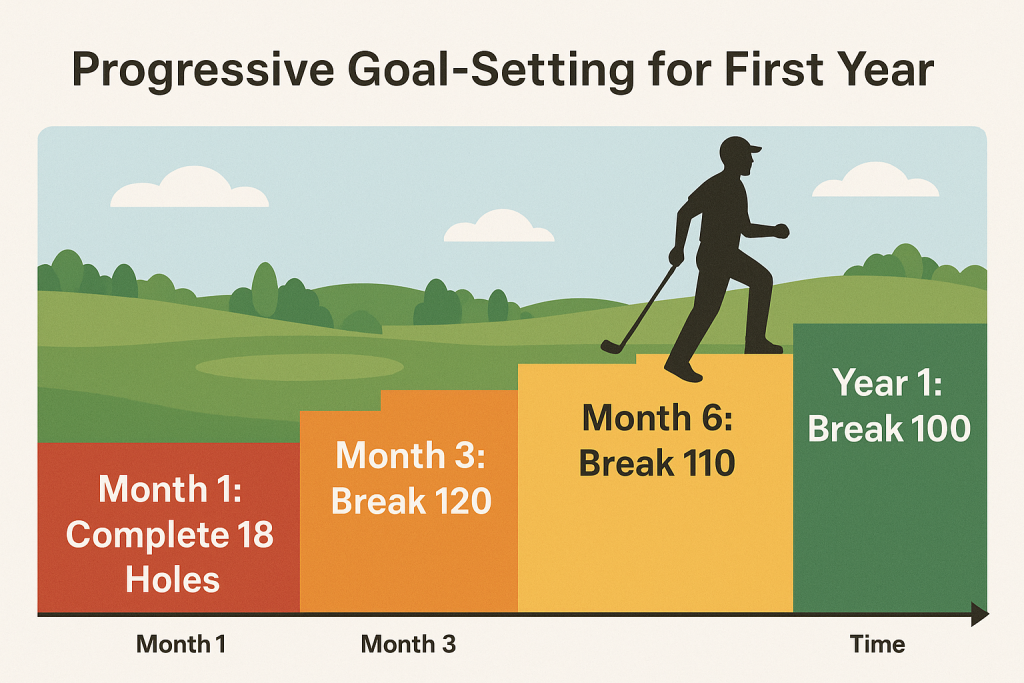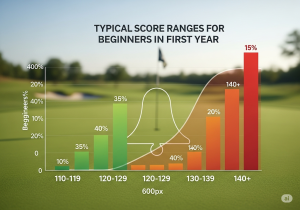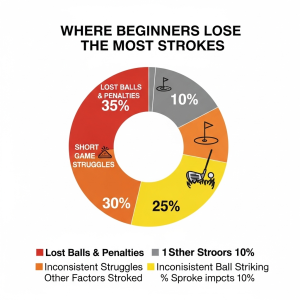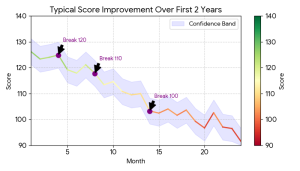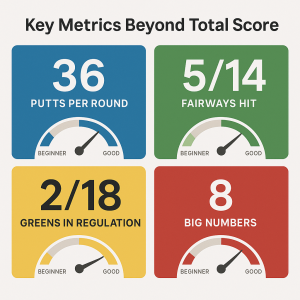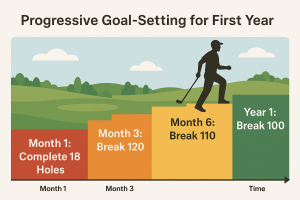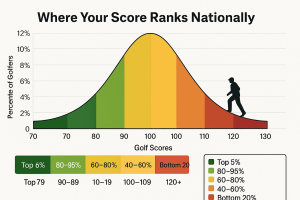What Should My Golf Score Be as a Beginner? Realistic Expectations by Experience Level
Last Updated: July 2025
"Am I terrible at this?"
It's the question that haunts every new golfer after their first few rounds. You've just finished 18 holes, your scorecard looks like a mathematical disaster, and you're wondering if you should take up bowling instead.
But here's the truth: your scores as a beginner are probably exactly where they should be.
After watching hundreds of beginning golfers and analyzing thousands of first-year scorecards, I've learned that unrealistic expectations destroy more golf dreams than bad swings ever could.
The good news? There are clear benchmarks for where you should be at every stage of your golf journey.
The reality: Most beginners shoot between 100-130 for their first several rounds, and that's completely normal. What matters isn't your current score—it's understanding the progression and having realistic goals.
In this complete guide, you'll discover:
- Realistic score expectations for your experience level
- How to track meaningful improvement beyond just total score
- What factors affect beginner scoring the most
- Goal-setting strategies that actually motivate progress
- When to celebrate improvements (hint: it's not just breaking 100)
- How your scores compare to other golfers nationwide
Let's set the record straight on beginner golf scores and give you a roadmap for real improvement.
The Truth About Beginner Golf Scores
First Round Reality Check
Your Very First Round:
- Typical Range: 110-140+ strokes
- Don't Even Count: Many beginners don't finish holes or count accurately
- Focus On: Having fun and learning basic rules
- Remember: Even Tiger Woods had a first round
First Month (3-5 rounds):
- Typical Range: 105-130 strokes
- Improvement Signs: Fewer lost balls, completing all holes
- Realistic Goal: Break 130 consistently
- Key Milestone: Playing by actual rules
First 3 Months (10+ rounds):
- Typical Range: 95-120 strokes
- Improvement Signs: Some pars, better course management
- Realistic Goal: Break 120, then 110
- Key Milestone: Understanding your tendencies
According to Golf Digest's beginner study, only about 20% of golfers consistently break 100, and most take 6 months to 2 years to reach that milestone.
Score Expectations by Experience Level
📊 Beginner Score Benchmarks
🔴 Complete Beginner (0-5 rounds):
- Average: 115-135
- Good Round: 105-115
- Celebration Goal: Finish 18 holes
🟡 Learning Phase (6-20 rounds):
- Average: 100-120
- Good Round: 95-105
- Celebration Goal: Break 110
🟢 Developing Player (21-50 rounds):
- Average: 90-110
- Good Round: 85-95
- Celebration Goal: Break 100
What Affects Your Golf Score as a Beginner
The Big Three Score Killers
1. Lost Balls and Penalties (30-40% of extra strokes)
- Average Impact: 10-15 strokes per round
- Common Causes: Slicing into woods, water hazards, out of bounds
- Quick Fix: Play more conservative shots, use easier courses
2. Short Game Struggles (25-35% of extra strokes)
- Average Impact: 8-12 strokes per round
- Common Issues: Chipping, pitching, putting from distance
- Quick Fix: Practice putting and basic chip shots
3. Inconsistent Ball Striking (20-30% of extra strokes)
- Average Impact: 6-10 strokes per round
- Common Problems: Topping, chunking, mis-hits
- Quick Fix: Focus on making solid contact over distance
Course Difficulty Impact
Easy/Beginner-Friendly Courses:
- Characteristics: Wide fairways, few water hazards, shorter length
- Score Impact: -5 to -10 strokes compared to difficult courses
- Recommendation: Play these for your first 20+ rounds
Standard Public Courses:
- Characteristics: Moderate difficulty, some hazards, standard length
- Score Impact: Baseline for measuring improvement
- Recommendation: Transition here after gaining confidence
Difficult/Championship Courses:
- Characteristics: Narrow fairways, many hazards, long length
- Score Impact: +10 to +20 strokes for beginners
- Recommendation: Avoid until you can consistently break 100
Realistic Score Progression Timeline
Month-by-Month Expectations
Months 1-2: Foundation Building
- Starting Score: 120-140
- Expected Progress: 5-10 stroke improvement
- Focus Areas: Basic swing, course rules, equipment familiarity
- Milestone Goal: Consistently finish 18 holes
Months 3-4: Skill Development
- Starting Score: 110-130
- Expected Progress: 5-8 stroke improvement
- Focus Areas: Short game basics, course management
- Milestone Goal: Break 120
Months 5-6: Game Understanding
- Starting Score: 105-125
- Expected Progress: 3-7 stroke improvement
- Focus Areas: Strategy, club selection, mental game
- Milestone Goal: Break 110
Months 7-12: Consistency Building
- Starting Score: 95-115
- Expected Progress: 2-5 strokes per quarter
- Focus Areas: Eliminating big numbers, short game precision
- Milestone Goal: Break 100
Year 2: Refinement
- Starting Score: 90-105
- Expected Progress: 1-3 strokes per quarter
- Focus Areas: All-around improvement, advanced strategy
- Milestone Goal: Break 90
Factors That Speed Up Improvement
Accelerated Progress (Better than average):
- Regular lessons with a PGA professional
- Consistent practice schedule (2+ times per week)
- Playing easier courses initially
- Athletic background in other sports
- Quality equipment fitted properly
Slower Progress (Still normal):
- Infrequent play (once per month or less)
- No formal instruction
- Playing difficult courses too early
- Equipment issues (wrong clubs, poor fit)
- High expectations causing frustration
Beyond Total Score: Meaningful Progress Metrics
Statistics That Matter More Than Score
1. Putts Per Round
- Beginner Average: 36-42 putts
- Good Target: Under 36 putts
- Why It Matters: Putting is 40% of your score
- Easy Improvement: Practice lag putting
2. Fairways Hit
- Beginner Average: 3-6 out of 14
- Good Target: 7+ fairways
- Why It Matters: Sets up easier approach shots
- Easy Improvement: Use more conservative clubs off tee
3. Greens in Regulation (GIR)
- Beginner Average: 1-3 out of 18
- Good Target: 4-6 greens
- Why It Matters: Creates birdie/par opportunities
- Easy Improvement: Better club selection and course management
4. Big Numbers (Double Bogey or Worse)
- Beginner Average: 8-12 holes with big numbers
- Good Target: Under 6 big numbers
- Why It Matters: One disaster hole ruins the round
- Easy Improvement: Course management and knowing when to lay up
Weekly Score Tracking
📈 Progress Tracking Template
This Week's Round:
- Total Score: ___
- Putts: ___
- Fairways Hit: ___/14
- Big Numbers: ___
- Best Hole: Par ___
- What Went Well: ________________
- Improvement Focus: ________________
Course Management for Better Scores
Smart Strategy for Beginners
Tee Shot Strategy:
- Driver: Only on wide, forgiving holes
- 3-Wood/Hybrid: Your go-to club for most tees
- Iron: When accuracy matters more than distance
- Goal: Keep ball in play, avoid penalties
Approach Shot Strategy:
- Target: Middle of green, not pin
- Club Selection: Take one more club than you think
- Miss Strategy: Short of green is usually better than long
- Goal: Avoid big numbers, accept bogeys
Short Game Strategy:
- Chipping: Use least lofted club that gets on green
- Putting: Lag long putts, be aggressive on short ones
- Bunker Play: Just get out, don't be a hero
- Goal: Eliminate three-putts and chunks
Course Selection for Better Scores
Beginner-Friendly Course Features:
- Wide fairways (40+ yards)
- Minimal water hazards
- Shorter length (under 6,200 yards)
- Forgiving rough
- Large greens
Courses to Avoid Initially:
- Links-style courses (too windy)
- Mountain courses (too many elevation changes)
- Championship venues (too penal)
- Courses with forced carries over water
Common Score Expectations vs. Reality
Myth Busting: What "Good" Really Means
Myth: "I should break 100 in my first month" Reality: Only 5% of beginners break 100 in their first 10 rounds
Myth: "Everyone else is better than me" Reality: Average golfer shoots 97-100, most never break 90
Myth: "I need to shoot par to enjoy golf" Reality: Par is professional level; bogey golf (90) is excellent for amateurs
Myth: "Bad scores mean I have no talent" Reality: Golf is the hardest sport to learn; progress takes time
Setting Realistic Goals
SMART Goals for Beginners:
Month 1 Goal: Complete 18 holes without picking up
- Specific: Finish every hole
- Measurable: 18 holes completed
- Achievable: With patience and persistence
- Relevant: Builds golf fundamentals
- Time-bound: Within first month
Month 3 Goal: Break 120 for a round
- Specific: Score under 120
- Measurable: Clear score target
- Achievable: With practice and course management
- Relevant: Significant improvement milestone
- Time-bound: 3-month timeframe
Month 6 Goal: Break 110 consistently
- Specific: Multiple rounds under 110
- Measurable: 3 out of 5 rounds under 110
- Achievable: With continued practice
- Relevant: Shows developing consistency
- Time-bound: 6-month timeframe
Year 1 Goal: Break 100
- Specific: Score in double digits
- Measurable: Round under 100 strokes
- Achievable: Top 25% of all golfers
- Relevant: Major golf milestone
- Time-bound: Within first year
When to Celebrate Your Progress
Milestone Moments That Matter
First Week Celebrations:
- Hitting your first solid shot
- Making your first putt longer than 3 feet
- Completing 18 holes
- Having fun despite the score
First Month Celebrations:
- Breaking 130
- Making your first par
- Going a full round without losing a ball
- Understanding basic golf etiquette
First Quarter Celebrations:
- Breaking 120
- Making two pars in one round
- Hitting a green in regulation
- Playing with confidence
First Year Celebrations:
- Breaking 110, then 100
- Making your first birdie
- Shooting your age + 50 (if you're 40, celebrating a 90)
- Enjoying golf more than you're frustrated
Tracking Long-Term Progress
🎯 Annual Review Questions
Scoring Progress:
- What was your best score this year?
- How many times did you break your previous best?
- What's your current average score?
Skill Development:
- Which part of your game improved most?
- What shots give you the most confidence?
- Where do you lose the most strokes?
Enjoyment Factor:
- Do you look forward to playing?
- Are you less frustrated than when you started?
- Have you made golf friends?
Mental Game and Score Management
Handling Bad Rounds
When Scores Go Backwards:
- Remember: Everyone has bad days
- Focus On: Process, not results
- Learn From: What went wrong specifically
- Move Forward: Next round is a clean slate
Frustration Management:
- Take Breaks: Step away if getting angry
- Lower Expectations: Some days just aren't your day
- Find Positives: Look for any good shots or moments
- Keep Perspective: You're learning one of the hardest sports
Building Confidence Through Realistic Expectations
Confidence Builders:
- Set process goals, not just score goals
- Celebrate small improvements
- Play easier courses when confidence is low
- Focus on fun over performance
Confidence Killers:
- Comparing yourself to better players
- Setting impossible score targets
- Playing courses too difficult for your level
- Focusing only on mistakes
Equipment Impact on Beginner Scores
Clubs That Help Lower Scores
Game Improvement Irons:
- Score Impact: -3 to -5 strokes
- Benefits: Larger sweet spots, more forgiveness
- Recommendation: Essential for beginners
Higher Lofted Driver:
- Score Impact: -2 to -4 strokes
- Benefits: More accuracy, less slice
- Recommendation: 10.5-12 degree loft minimum
Quality Putter:
- Score Impact: -2 to -3 strokes
- Benefits: Better feel, improved consistency
- Recommendation: Get properly fitted
Proper Ball Choice:
- Score Impact: -1 to -2 strokes
- Benefits: Distance and feel matched to swing speed
- Recommendation: Low compression balls for slower swings
When Equipment Changes Help
Upgrade When:
- You've been playing 6+ months consistently
- Current clubs are poorly fitted
- You're making solid contact but getting poor results
- You've outgrown your current skill level
Don't Upgrade When:
- You're still learning basic swing fundamentals
- Inconsistent ball contact is your main issue
- You play less than once per month
- Equipment becomes an excuse for poor play
Comparing Your Scores to Other Golfers
National Scoring Averages
Score Percentiles for All Golfers:
- 120+: Bottom 20% (beginner level)
- 110-119: 20th-40th percentile (developing)
- 100-109: 40th-60th percentile (average recreational)
- 90-99: 60th-80th percentile (good recreational)
- 80-89: 80th-95th percentile (very good)
- 70-79: Top 5% (excellent)
- Under 70: Top 1% (elite amateur)
Age and Gender Considerations:
- Women typically score 10-15 strokes higher due to course length
- Seniors (65+) average 5-10 strokes higher than prime-age golfers
- Junior golfers vary widely based on experience and development
Realistic Comparisons
Compare Yourself To:
- Your own previous scores
- Golfers with similar experience levels
- National averages for your demographic
- Achievable goals based on practice time
Don't Compare Yourself To:
- Scratch golfers or professionals
- People who've been playing for decades
- Social media highlight reels
- Unrealistic expectations from TV/movies
Creating Your Personal Improvement Plan
30-60-90 Day Score Goals
30-Day Plan: Foundation
- Current Score: ___
- Goal: Reduce by 5-8 strokes
- Focus: Course management, eliminating disasters
- Practice: 70% short game, 30% full swing
- Play: 4-6 rounds on easier courses
60-Day Plan: Consistency
- Current Score: ___
- Goal: Reduce by 3-5 strokes
- Focus: Consistent ball striking, smart club selection
- Practice: 50% short game, 50% full swing
- Play: 6-8 rounds, gradually increase course difficulty
90-Day Plan: Breakthrough
- Current Score: ___
- Goal: Reduce by 2-4 strokes
- Focus: Eliminating weak areas, mental game
- Practice: Address biggest weaknesses
- Play: 8-10 rounds, track detailed statistics
Practice Allocation for Score Improvement
⏰ Optimal Practice Schedule for Beginners
Putting (40% of practice time):
- 3-foot putts for confidence
- Lag putting for distance control
- Reading greens basics
Chipping (30% of practice time):
- Basic chip shots with 7-iron
- Different lies and distances
- Bump and run technique
Full Swing (30% of practice time):
- Solid contact drills
- Shorter irons first
- Driver only after consistent contact
Frequently Asked Questions
"Is a score of 120 bad for a beginner?"
Not at all! A score of 120 is perfectly normal for someone in their first few months of golf. Focus on improvement trends rather than comparing to experienced players.
"How long should it take me to break 100?"
Typically 6 months to 2 years depending on practice frequency, natural ability, and quality of instruction. Most golfers who break 100 have played 50+ rounds.
"Should I take lessons if I'm shooting over 110?"
Absolutely yes. Lessons are most valuable for beginners. A few lessons early can prevent bad habits and accelerate improvement by months or years.
"What's more important: distance or accuracy?"
Accuracy by far. A 200-yard drive in the fairway beats a 250-yard drive in the woods every time. Focus on keeping the ball in play.
"Should I count penalty strokes and lost balls?"
Yes, count everything. Honest scoring helps you understand your real skill level and track genuine improvement. Cheating only cheats yourself.
"Is it normal for my scores to vary wildly?"
Completely normal. Beginners might shoot 105 one day and 125 the next. Consistency comes with experience and practice.
Your Score Journey Starts Now
Understanding realistic golf score expectations transforms frustration into motivation. Your current score—whether it's 95 or 135—is simply your starting point on an incredible journey of improvement.
Remember these key truths:
- Every golfer started as a beginner with high scores
- Improvement takes time but happens consistently with practice
- Small improvements matter more than dramatic breakthroughs
- The journey is more important than any single score
- Golf is meant to be enjoyed at every skill level
Your next steps:
- Set realistic goals based on your current score and experience
- Track meaningful metrics beyond just total score
- Practice with purpose focusing on short game
- Play appropriate courses for your skill level
- Be patient with progress and celebrate small wins
The golf score that matters most isn't what you shoot today—it's the improvement you see tomorrow. Every round is an opportunity to get better, have fun, and fall in love with this incredible game.
Ready to improve your scores? Check out our guides on golf swing basics for beginners and essential short game tips to start lowering your scores.
Related Articles:
- What Does Golf Handicap Mean? Complete Beginner's Guide
- How Long Does 18 Holes of Golf Take? Complete Timing Guide
- Best Golf Equipment for High Handicappers
What's your current average score? Share in the comments below and let's celebrate your golf journey together!
